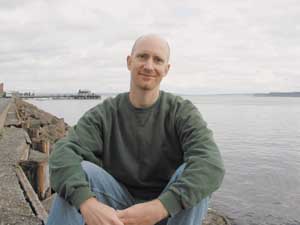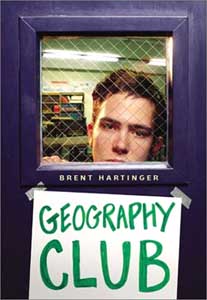-
- Lesbian minister’s congregation celebrates her victory
- Backers of Bush’s marriage-promotion plan struggle to disentangle it from same-sex marriage debate
- Transsexual faces charge of falsely obtaining marriage license
- Controversial Republican lawmaker loses primary endorsement
- Arkansas suit explores whether state can ban GLBTs as foster parents
- Guilford County, NC school policy not curbing anti-gay discrimination
- Some unhappy with Girl Scouts form new, Christian-based group
- National News Briefs
- World News Briefs
Arts & Entertainment
Geography lesson: An interview with ‘Geography Club’ author Brent Hartinger
Published Thursday, 25-Mar-2004 in issue 848
Brent Hartinger is an important new voice in the realm of GLBT Young Adult literature. His debut novel Geography Club (Harper Tempest, New York, NY, 2003, $6.99, 226pp), about a group of students who secretly form a Gay/Straight Alliance club in a high school, has been nominated for a Lambda Literary Award. His second young adult novel, The Last Chance Texaco (Harper Tempest, New York, NY, 2004, $15.99, 228pp), set in a group home, doesn’t have any gay characters, but it is about the outsider experience. Recently, the Gay & Lesbian Times spoke with Hartinger about his novels and other projects.
The Gay & Lesbian Times: I’d like to begin by congratulating you on your Lammy nomination for The Geography Club. How does it feel to have your first book recognized in that way?
Brent Hartinger: Thank you. It’s fantastic. The whole experience has been like a dream come true. My career up until this point – everything that could have gone wrong has gone wrong (laughs). Then, when I published the book, everything that could go right has gone right. I got the right editor. I got the right publishing house. I got a series of breaks along the way. People liked the book; I guess that was the most important thing. There wasn’t a whole lot like it. It got a lot of attention and it sold really well. To then be nominated for an award and it’s won a couple of other awards.
GLT: What other awards has it won?
BH: It was just named as one of Book List’s top ten first young adult novels. It was a Book Sense 76 summer pick, which is actually a big deal. That meant it was featured in all the independent bookstores. I could be wrong, but I think that was the first time that they’d featured a gay children’s book in that way. Julie Ann Peters [another Lammy Nominee] and I were both featured this summer. She did a book called Keeping You A Secret. An interesting thing about the Lammy category that we’re in, which is Children/YA [Young Adult], you’ll notice that there are no children’s books, that they’re all YA, and that’s because it was such a strong year for lesbian and gay young adult [fiction]. I really think that speaks to there being something in the air. That all of our books, I know David [Levithan] and Alex [Sanchez] and Julie, I know that all of our books have done better than was expected. And in Alex and my case, they were extremely hard to get published because people said there was no market for a book about gay teenagers.
GLT: It’s interesting that you should mention that there are no children’s titles because Annie On My Mind author Nancy Garden, who may very well be the best-known young adult novelist writing on GLBT themes, has just published a brand new children’s book. But there are other young adult novelists, such as Jackie Woodson (Autobiography of A Family Photo) and Francesca Lia Block (Weetzie Bat and others), who have also been paving the way for this to happen.
BH: The ones you mentioned, obviously, were very successful. But some of the other titles were sort of quietly slipped into the world. They were not pushed, they were small presses. They were basically sold to libraries. Simon & Schuster pushed [Alex Sanchez’s] Rainbow Boys and it was very well received and it got a lot of media attention. This all happened just as I sold my book, so I was pulling my hair and becoming frustrated. But Alex is a great guy and I like the book a lot. I was a little annoyed that my book was not the first, but if it had to be anybody, I’m glad it was Alex. He just legitimized the whole industry. It wasn’t that his editor was particularly brilliant. I think there were a lot of books in the works, including my book and Julie’s. There was something in the air and his just happened to be first. I hope that there aren’t a bunch of horrible rip-off books [forthcoming], but if there are, as they say, “Imitation is the sincerest form of flattery.” I think that there are still plenty of gay teen stories yet to tell. I just hope that publishers don’t rush out a bunch of books that are lower quality because they think they can sell them. It hasn’t happened yet. We’ve got a good little thing going here and I don’t want it to be diluted with a bunch of crap.
GLT: I understand that there is at least one Geography Club sequel – The Order of the Poison Oak, featuring the character of Russel Middlebrook – forthcoming. Are there others in the works?
BH: I turned in the sequel this fall and both my editor and the publisher are very pleased with it. In fact, he was so pleased that he does want to do a third book, which would be my fifth book for Harper Collins. Unfortunately, we’re talking [a publications date of] 2007. We’re talking about maybe a book a year in the series for who knows how long. I said to my partner, Michael, “Do you think I should do this?” And he said, “Are you nuts? They’re asking you to write a sequel to a sequel. Of course you should do it.” I love the character and when I sat down to write the sequel, I had forgotten how much I liked the characters, so I’m more than happy to do that.
GLT: How much of you can be found in Russel?
BH: Quite a bit. I say on my website, “He acts like me, thinks like me, and looks like me. Or at least the way I looked in high school.” But writers are never supposed to admit that characters are completely autobiographical. It’s funny – I like him a lot, but he’s not me exactly. There are a few things that are different. Even if there weren’t, when you create a character, there is always a bit of distance and perspective between you and your character. That said, it’s a pretty autobiographical character, which is why I was greatly relieved – I didn’t really think about this while I was writing the book, but afterwards, and people started critiquing the book and Russel, it occurred to me that it was a dangerous thing that I was doing because they were going to be critiquing me. Had the reviews come out and people said, “I like the book, but the main character is such a jerk! Didn’t like him at all.” It would have been hard not to take that personally because he is such an autobiographical character. Fortunately, people responded quite favorably to him.
GLT: Are you doing readings and speaking engagements around the book?
BH: I think I did something like 40 speaking engagements this past year. I didn’t get invited to any schools with Geography Club. The Last Chance Texaco has been out for a week and I’ve been invited to six schools. I think that speaks to the fact that nobody wants to touch the gay thing. I understand that. I don’t want to get any teachers in trouble. I spoke to a lot of gay youth groups, and some civic groups and at PFLAG meetings. I’ve spoken at several conferences and I have five more conferences booked this year. I’m not an extrovert and I have been pleasantly surprised by how wonderful and receptive the audiences have been. Of course, the people who come are those who have responded to it in some way. That and the e-mail have been the best parts of the whole publishing experience. I’ve also met with a few teenage book clubs and I’ve really enjoyed the conversation because they can speak directly to what’s going on in high schools today.
GLT: Russel, Min, Kevin and the other characters in Geography Club come to life in the stage adaptation of the book. Please say something about that.
BH: We were approached right after the book came out by the agent who represented a book called Holes, which was turned into a stage play and later into a movie, which came out last May (2003), and it did really well. So, I adapted Geography Club into a play and I was pleasantly surprised at how easy it was to adapt. I think it’s because in the young adult genre, the books are shorter; they’re more spare. Typically whatever genre I’m writing in, I write from a three-act structure anyway. I started out as a playwright and I think that’s evident in all of my writing. It’s been wonderful to, as you said, see the characters come to life in the form of actors and bring a new dimension.
GLT: Your new book, The Last Chance Texaco, is set in the realm of group homes. A Life Without Consequences, a 2002 novel by Stephen Elliott is also set within that world. Why do you think that this subject is being explored?
BH: First and foremost, I think it just makes a good story. A story is a struggle of a character against overwhelming odds and I don’t think you can have a situation more overwhelming than foster care or living in a group home. I think that on a basic story level, it works. On the level of societal misunderstanding, I think there is a place for this book, too. The story hasn’t been told a lot. I don’t think there is a definitive portrait yet. When I walked into a group home for my first day of work over 10 years ago, it immediately struck me what an interesting situation it was. There was so much going on. I was fascinated by the reasons why this eccentric group of counselors ended up choosing to work in foster care. Then, of course, the children had really interesting, sometimes disturbing, stories as to how they ended up there, too. That’s the writer’s job – to look around, experience interesting things, then transform it into an entertaining and hopefully thought provoking project of some sort.
|
|
Copyright © 2003-2025 Uptown Publications



